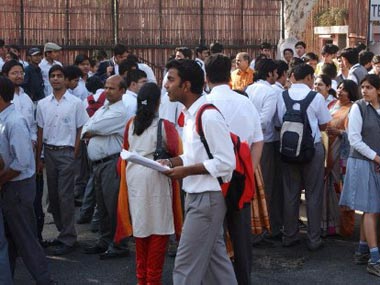The new common entrance test for national technical institutions such as IITs, NITs and IIITs, will at least partially bring back the importance of class room education and render a big blow to the mega buck IIT coaching-industry that has grown exponentially over the years. At the same time, the emphasis on the marks of class 12 exams might lead to a new rat-race that might benefit private capital and endanger the aspirations of poor and rural kids. For millions of children in the country, IITs and NITs carry a hallowed premium because they are the only options for public funded world-class higher education. Since the admission to these institutions are based only on objective type entrance tests, a large number of school children, often with the connivance of school managements, abandon class room education and end up in coaching classes. The coaching classes, synonymous with some institutions in Andhra Pradesh, Rajastan and Bihar with high hit-rates as well as a national network, put the kids through a gruelling drill spanning two-three years to crack the test. The focus at these institutions is not on academics or learning the subject well, but on correctly answering as many questions as possible. They train the kids in a process, not necessarily on what that process is based on. [caption id=“attachment_324591” align=“alignleft” width=“380” caption=“The new common entrance test for national technical institutions such as IITs, NITs and IIITs, will at least partially bring back the importance of class room education. AFP”]  [/caption] The Joint Entrance Examination, better known as JEE, is the toughest engineering entrance test in the country. The test is so competitive that a candidate correctly answering even 35% of the questions in 2012 have found entry into the rank list, although it doesn’t necessarily guarantee admission. The five old IITs have consistently topped the engineering institutions in the country and together form the citadel that at least half a million competitive teenagers fantasise about every year. Of late, experts have expressed serious concerns over the plunging quality of the students of IITs, which have benchmarked or rather branded excellence of Indian technical education across the world. Former Infosys chairman NR Narayanamurthy said last year that “they (the candidates) somehow get through the JEE but their performance in IITs, at jobs or when they come for higher education in institutes in the US is not as good as it used to be.” Speaking at the Pan-IIT summit in New York in October 2011, he also said that except for the top 20 percent who crack the tough IIT exam and can stand among the best anywhere in the world, the quality of the remaining 80 percent of students leaves much to be desired. He singularly blamed the coaching classes for the debacle. “Thanks to the coaching classes today, the quality of students entering IITs has gone lower and lower.” Murthy should know because Infosys hires a large number of students from IITs. Today, many schools have outsourced their classrooms to private IIT training franchisees, that too at a huge premium leading to the creation of two classes of students in the same school - those who can afford the exclusive IIT-training classes within the school itself and the others who stay back in regular classrooms. Needless to say, most of the privileged zones within the schools are air-conditioned and plush while the rest are cattle-class. Continues on the next page The private classes are mostly run by the faculty of the franchisees and not the school teachers. This system pushes trained and qualified school teachers, who are non-JEE compliant, into teaching the second-class students. Students of this upper class parallel system may score well in JEE, but their CBSE/board (class 12) marks take a beating. However archaic the curriculum may be, class XII education is the foundation on which the future academics of children depend. Even with all its drawbacks, it sets the baseline for knowledge on the subjects the children choose to pursue. Compromising on them often compromises the quality of excellence in higher education. It could be one of the reasons why our IITs produce fewer PhDs, as highlighted by Murthy. The new JEE is in fact an attempt to arrest the coaching-industry driven slide towards cracking entrance tests as well as to reduce the multiple tests that the children need to take. The new system will give equal weightage for class 12 marks and will also integrate exams for IITs, NITs and IIITs into a single enterprise. For the IITs, the admission will give equal weightage to the class 12 marks and the JEE. However, the students will have to take two JEE - first the preliminary and then the advanced JEE. In simple words, students who take the JEE will be initially evaluated with 50 percent weightage for class 12 and 50 percent for the entrance exam. A fixed number of students (say, five times the admissible number) will be selected through this process and will be asked to write an advanced JEE. The candidates who top this test will find admission to the IITs. While the preliminary JEE will be objective, the nature of the advanced JEE is yet to be decided. For other institutions such as NITs and IIITs, it will be a 40/30/30 formula. Means 40 percent for class XII , 30 percent for JEE and another 30 percent for advanced JEE. Besides compelling students to focus on subject matter, the new system will also reduce the entrance burden on the kids. Now they write two very competitive tests - JEE and AIEEE, for admission into IITs and NITs. Next year onwards, they got to write only one JEE. The main opposition to the new formula has come from coaching institutions such as the “Super 30” in Bihar, which has set a global example for training poor, rural students in cracking the JEE. Anand Kumar, the founder of the centre with a near 100 percent success rate, said the new format will put rural students at a great disadvantage. He said that the new system will force the students to undergo three types of coaching - one for the preliminary, another for advanced-JEE and the third for class 12 itself. While his argument is based only on the contestable indispensability of coaching, he is right on the quality of schooling. According to him, rural areas do not have good quality schools that will ensure that they get good marks in class 12. Perhaps, the new exam will be the beginning of a tectonic shift in the purpose and quality of school education in India. The premium on school leaving marks will lead to a huge demand for good schooling. If Kapil Sibal is indeed sincere in improving the quality of education this is the time to work at it. He needs to instantly look at improving the quality of school education, which will require massive government investment and reforms. Otherwise, as happened in higher and technical education in the recent past, private sector will find a more lucrative market in school education and will push millions of poor and rural kids out of the system. The detractors might even allege that the new JEE is a ploy to make school education more attractive to private investment, which will definitely sound the death knell for poor and rural students. It’s only the deeds of Kapil Sibal and his team that will be able to answer these allegations. They should ensure that while they seek to improve one part of the system, there is intimate attention paid to the complex changes that it might lead to because social transformations are not easy and there are no short cuts.
Changing the IIT exam isn’t enough to stop the coaching menace, if Kapil Sibal is indeed sincere in improving the quality of education the Indian school system needs to be reformed radically.
Advertisement
End of Article


)
)
)
)
)
)
)
)
)



